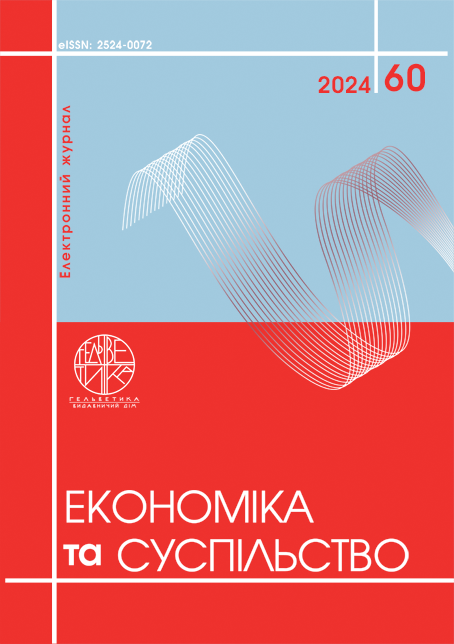ЯКІСТЬ ТОВАРУ ЯК УМОВА ЕФЕКТИВНОГО БРЕНДИНГУ
Анотація
У статті визначаються умови створення успішного бренду, який має мак-симізувати попит на продукцію фірми. Збільшення обсягів реалізації її економічного зростання та підвищення ринкової вартості. Показана необ-хідність взаємодії складових системи «реальний товар – бренд» для потен-ційних споживачів. Акцентується увага на поняття бренду як надбудові над реальним товаром, що вимагає відповідальності обіцянок бренду екс-плуатаційним характеристикам і споживчим властивостям товару. В коор-динатах «якість товару – відповідальність бренду якості товару» побудо-вана матриця ситуацій, де визначена перспектива розвитку брендів. Роз-роблена схема реакції ринку на бренд неякісного товару і показані наслід-ки для підприємства при реалізації товару, що не відповідає обіцянкам бренду. Наведені методи оцінки економічного ефекту й економічної ефек-тивності брендингу, що дозволяють оцінити ці показники в першому на-ближенні.
Посилання
Григорчук Т.В. Брендинг : навчальний посібник [для дистанційного нав-чання]. Київ : КНУКМ, 2019. 163 с.
Давидов О. І. Моделі доданої вартості підприємств: економічний зміст та особливості побудови. Науковий вісник Міжнародного гуманітарного уні-верситету. 2017. Вип. 28. С. 167–172.
Ільчук В. П., Лисенко І. Маркетингові дослідження споживчого ринку в умовах воєнного стану: особливості і пріоритети. Науковий вісник Полісся. 2023. № 2(27). С. 328–342.
Королюк Н. Я. Обґрунтування необхідності оцінки ефективності вико-ристання бренду. Науковий вісник Херсонського державного університету. Серія Економічні науки. 2015. Випуск 13. Частина 4. С. 43–46.
Костинець В. В. Методичні засади оцінювання економічної ефективності туристичних брендів. Актуальні проблеми економіки. 2014. № 3. С. 160–165.
Лисенко І., Пономаренко А. Створення та розвиток e-commerce брендів в умовах цифровізації. Проблеми і перспективи економіки та управління. 2023. № 3(35). С. 82–97.
Лисенко І., Бойко В. Роль брендування у створенні стійкої конкуренто-спроможності бізнесу в умовах цифровизації. Сталий розвиток економіки, суспільства та підприємництва : мaтepiaли Міжнар.наук.-практ. конф., Іва-но-Франківськ, 27-28 квітня 2023 р. / за ред. І. Перевозової. Львів : Вида-вець Кошовий Б.-П.О., 2023. С. 448–451.
Міокова Г. І. Вартість підприємства та її оцінка. Наукові праці Кірово-градського національного технологічного університету. Економічні науки. Вип. 22, ч. ІІ, 2012. С. 149–156.
Новіков В. М. Теоретичний аналіз моделей оцінки доданої вартості біз-несу. Вісник Сум ДУ. Серія «Економіка. 2022. № 3. С. 91–96.
Плетньова Ю. К., Марченко В. М. Аналіз існуючих методик розрахунку доданої вартості на підприємстві. Економічний аналіз : зб. наук. праць. 2018. Т. 28, № 2. С. 168–175.
Файвішенко Д. С. Оцінка ефективності брендингу: функціональний під-хід. Маркетинг і менеджмент інновацій. 2012. № 4. С. 136–142.
Фінанси підприємств : підручник / [Поддєрьогін А. М., Білик М. Д., Бу-ряк Л. Д. та ін.] ; кер. кол. авт. і наук. ред. проф. А. М. Поддєрьогін. 8-ме вид., перероб. та доп. Київ : КНЕУ, 2013. 519 с.
Hryhorchuk T. V. (2019) Brendynh: navchalnyi posibnyk dlia dystantsiinoho navchannia [Branding: a study guide for distance learning]. Kyiv: KNUKM, 163 p. (in Ukrainian)
Davydov O. I. (2017) Modeli dodanoi vartosti pidpryiemstv: ekonomichnyi zmist ta osoblyvosti pobudovy [Models of the added value of enterprises: economic content and peculiarities of construction]. Naukovyi visnyk Mizhnarodnoho humanitarnoho universytetu – Scientific Bulletin of the Interna-tional Humanitarian University, vol. 28, pp. 167–172.
Ilchuk V. P., Lysenko I. (2023) Marketynhovi doslidzhennia spozhyvchoho rynku v umovakh voiennoho stanu: osoblyvosti i priorytety [Marketing research of the consumer market under martial law: features and priorities]. Naukovyi visnyk Polissia – Polissya scientific bulletin, No. 2(27), pp. 328–342.
Koroliuk N. Ya. (2015) Obgruntuvannia neobkhidnosti otsinky efektyvnosti vykorystannia brendu [Justification of the need to evaluate the effectiveness of the brand use]. Naukovyi visnyk Khersonskoho derzhavnoho universytetu. Seriia Ekonomichni nauky – Scientific Bulletin of Kherson State University. Economic sciences series, vol. 13, part 4, pp. 43–46.
Kostynets V. V. (2014) Metodychni zasady otsiniuvannia ekonomichnoi efektyvnosti turystychnykh brendiv [Methodological principles of evaluating the economic efficiency of tourist brands]. Aktualni problemy ekonomiky – Actual problems of the economy, No. 3, pp. 160–165.
Lysenko I., Ponomarenko A. (2023) Stvorennia ta rozvytok e-commerce brendiv v umovakh tsyfrovizatsii [Creation and development of e-commerce brands in the conditions of digitalization]. Problemy i perspektyvy ekonomiky ta upravlinnia – Problems and prospects of economics and management, No. 3(35), pp. 82–97.
Lysenko I., Boiko V. (2023) Rol brenduvannia u stvorenni stiikoi konkurentospromozhnosti biznesu v umovakh tsyfrovyzatsii [The role of brand-ing in creating sustainable business competitiveness in the conditions of digitali-zation]. Stalyi rozvytok ekonomiky, suspilstva ta pidpryiemnytstva: matepialy Mizhnar.nauk.-prakt. konf. (Ivano-Frankivsk, April 27-28, 2023) (ed. I. Perevozova). Lviv: Vydavets Koshovyi B.-P.O., pp. 448–451. (in Ukrainian)
Miokova H. I. (2012) Vartist pidpryiemstva ta yii otsinka [ Value of the enter-prise and its assessment]. Naukovi pratsi Kirovohradskoho natsionalnoho tekhnolohichnoho universytetu. Ekonomichni nauky – Scientific works of the Ki-rovohrad National Technological University. Economic sciences, vol. 22, part II, pp. 149–156.
Novikov V. M. (2022) Teoretychnyi analiz modelei otsinky dodanoi vartosti biznesu [Theoretical analysis of business value added assessment models]. Visnyk Sum DU. Seriia Ekonomika – Bulletin of Sumy State University. The series "Eco-nomics, No. 3, pp. 91–96.
Pletnova Yu. K., Marchenko V. M. (2018) Analiz isnuiuchykh metodyk rozrakhunku dodanoi vartosti na pidpryiemstvi [Analysis of existing methods for calculating added value at the enterprise]. Ekonomichnyi analiz: zb. nauk. prats – Economic analysis: coll. of science works, vol. 28, No. 2. pp. 168–175.
Faivishenko D. S. (2012) Otsinka efektyvnosti brendynhu: funktsionalnyi pidkhid [Evaluation of branding effectiveness: a functional approach]. Marketynh i menedzhment innovatsii – Marketing and innovation management, No. 4. pp. 136–142.
Poddierohin A. M. (ed.), Bilyk M. D., Buriak L. D. (2013) Finansy pidpryiemstv: pidruchnyk [Enterprise finance: a textbook]. Kyiv: KNEU, 519 p. (in Ukrainian)

Ця робота ліцензується відповідно до Creative Commons Attribution 4.0 International License.


